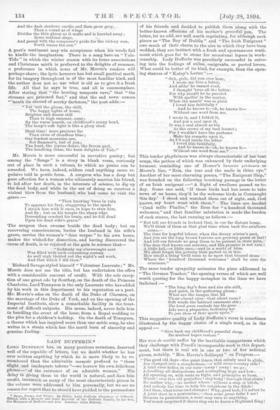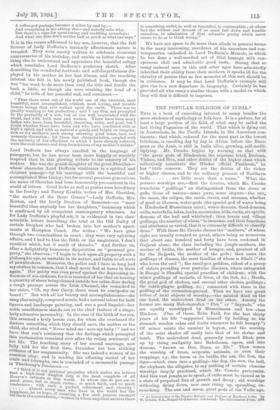LADY DUFFERIN.* LOED DUFFERIN has, on many previous occasions, deserved
well of the republic of letters, but we doubt whether he has ever written anything by which he is more likely to be re- membered than the admirable memoir prefixed to " these slight and inadequate tokens "—we borrow his own felicitous phrase—" of the existence of an adorable woman." His delay in giving them to the world is natural, and does him credit, inasmuch as many of the most characteristic pieces in the volume were addressed to him personally, but we see no reason for regret that he should have yielded to the persuasions * Bones, Poems. and Verses. 13y Helen, Lady Dufforin (Countess of Gifford). Edited, with a Memoir and some Account of the Dofferin Family, by her Son, the Marquees of Dufferin and Ara. Loudon : John Murray. of his friends and decided to publish them along with the better-known effusions of his mother's graceful pen. The latter, let us add, are well worth reprinting, for although such pieces as "The Bay of Dublin" and " The Irish Emigrant" owe much of their charm to the airs to which they have been wedded, they are instinct with a fresh and spontaneous senti- ment which goes far to atone for occasional lapses in work- manship. Lady Dufferin was peculiarly successful in enter., ing into the feelings of exiles, emigrants, or parted lovers. What could be better of its kind, for example, than the open- ing stanzas of " Katey's Letter " " Och, girls, did you ever bear, I wrote my love a letter,
And altho' he cannot read, I thought 'twas all the better. For why should he be puzzled With spellin' in the matter, When the manila was so plain
I loved him faithfully P And he knows it—oh, he knows it—
Without one word from me.
I wrote it, and I folded it,
And put a seal upon it, It was a seal almost as big As the crown of my best bonnet ;
For I wouldn't have the postman
Make his remarks upon it, As I'd said inside the letter I loved him faithfully,
And he knows it—oh, he knows it—
Without one word from me."
This tender playfulness was always characteristic of her best songs, the pathos of which was enhanced by their underlying humour, reminding one of Homer's acespu‘EP yaoleascs or Moore's line, "Erin, the tear and the smile in thine eye." Another of her most charming poems, "The Emigrant Ship," was founded on the following touching passage in the letter of an Irish emigrant :—" A flight of swallows passed us to- day. Some one said, ' If those birds had but sense to take news of us home, they'd be the welcome birds in Connaught this day.' I stood and watched them out of sight, and, God knows, my heart went with them." The lines are headed Cead mille Phailte," the Erse for " a hundred thousand welcomes," and that familiar salutation is made the burden of each stanza, the last running as follows :— " But tell our friends in Ireland that, in cur far distant home, We'll think of them at that glad time when back the swallows come,—
The time for hopeful labour, when the dreary winter's past, And you see the long brown furrows are growing green at last! And tell our friends we pray them to be patient in their pain, The dear God knows our sorrows, and His promise is not vain ! A little toil,—a little care,—and in a world of bliss We shall forget the poverty that parted us in this. How small a thing 'twill seem to us upon that blessed shore Where the hundred thousand welcomes' shall be ours for evermore."
The same tender sympathy animates the piece addressed to " The German Teacher," the opening verses of which are well worth quoting for the happy metaphor in the lines we have italicised :— " The long day's done and she sits still, And quiet, in the gathering gloom : What are the images that fill Those absent eyes—that silent room P Soft winds the latticed casement stir ; The hard green rosebuds tap the pane Like merry playmates, beckoning her To join them at their sports again."
This suggestive quality of Lady Dufferin's verse is sometimes illustrated by the happy choice of a single word, as in the
appeal:-- " Give back my childhood's peaceful sleep, Its aimless hopes restore"
Her very de soeiete suffer by the inevitable comparisons which they challenge with Praed's incomparable work in this depart- ment, but there is real wit in one or two of her satirical pieces, notably, "Mrs. Harris's Soliloquy" on Progress :--• "The good old days—the quiet times, that calmly used to glide, Are changed into a steeplechase,—a wild cross-country ride A loud view-holloa in our ears—away ! away ! we go ; A-levelling all distinctions, and a-mingling high and low: All spurring on, with seats so tight, and principles so loose, Whisk over this old prejudice ! slap bang through that abuse ! No matter why, no matter where without a stop or hitch, And nobody has time to help his neighbour in the ditch And then, what turns and changes ! Why, good lack, I'd rather be A joint stool in a pantomime,—than some great folks I see ! Because in pantomimes, a stool may turn to anything, You're not surprised if chairs step out to dance a Highland fling
A coffee-pot perhaps becomes a mitre by and by,— And everything is something else—and nobody asks why. But there's a rage for questioning and meddling nowadays; And what one does don t matter half so much as what one says."
It is in the verses addressed to her son, however, that the full fervour of Lady Dufferin's intensely affectionate nature is revealed. They were mostly written to celebrate recurrent anniversaries of his birthday, and enable us better than any- thing else to understand and appreciate the beautiful eulogy which concludes Lord Dufferin's prefatory sketch. After describing the wonderful fortitude and self-forgetfulness dis- played by his mother in her last illness, and the touching interest she felt in his newly published book, though she was "too weak to do more than read the title and fondle the book a little, as though she were stroking the head of a child," he tells of her peaceful end, and continues :— " Thus there went out of the world one of the sweetest, most beautiful, most accomplished, wittiest, most loving, and lovable human beings that ever walked upon the earth. There was no quality wanting to her perfection ; and I say this, not prompted by the partiality of a son, but as one well acquainted with the world, and with both men and women. There have been many ladies who have been beautiful, charming, witty, and good, but I doubt whether there have been any who have combined with so high a spirit, and with so natural a gaiety and bright an imagina- tion as my mother's, such strong unerring good sense, tact, and womanly discretion ; for these last characteristics, coupled with the intensity of her affections to which I have already referred, were the real essence and deep foundations of my mother's nature." Lord Dufferin has always excelled in the language of panegyric, but he has never been more happily or worthily inspired than in this glowing tribute to the memory of his mother. She was the grand-daughter of the great Sheridan— whose character Lord Dufferin vindicates in a spirited and eloquent passage—by his marriage with the beautiful and accomplished Miss Linley ; but for several previous generations the name of Sheridan had been honourably pre-eminent in the world of letters. Good looks as well as genius were hereditary in the family ; and Fanny Kemble writes of Mrs. Sheridan, "the mother of the three Graces "—Lady Dufferin, Mrs. Norton, and the lovely Duchess of Somerset—as "more beautiful than anybody but her daughters," testimony which is confirmed by all competent contemporary witnesses. As for Lady Dufferin's playful wit, it is evidenced in two char- acteristic letters describing the trial at the Old Bailey of certain burglars who had broken into her mother's apart- ments at Hampton Court. She writes : " We have gone through two examinations in court : they were very agitating affairs, and I had to kiss the Bible or the magistrate, I don't recollect which, but it smelt of thumbs." And further on, after a delightfully humorous disquisition on "personal pro- perty," she observes : " I begin to look upon all property with a philosophic eye, as unstable in its nature, and liable to all sorts of pawnbrokers. Moreover, the police and I have so long had my clothes in common, that I shall never feel at home in them again." Her gaiety was even proof against the depressing in- fluences of sea-sickness, for it is recorded of her that on hearing a quantity of shoes being cleaned outside her cabin-door during a rough passage across the Irish Channel, she remarked to her sister, "Oh, my dear Carry, there must be centipedes on board ! " But with all her beauty and accomplishments—she sang charmingly, composed music, had a natural talent for both figures and landsiape painting, and was a good linguist—her noble unselfishness stands out as the chief feature of a singu- larly attractive personality. In the case of the birth of her son, this assumed a truly heroic cast, for when she overheard the doctors consulting which they should save, the mother or the child, she cried out, " Never mind me ! save my baby ! " and we have that son's testimony that the feelings which prompted this exclamation remained ever after the ruling sentiment of her life. The touching story of her second marriage, now fully told for the first time, furnishes not less striking evidence of her magnanimity. She was indeed a woman of no common clay; and in reading the affecting recital of her trials and triumphs, one is reminded of a memorable passage in Thackeray's Pendennis :- " I think it is not Enatiional prejudice which makes me believe that a high-bred nn flish lady is the most complete of all lie
Heaven's subjects i virtue In whom else do you see so much grace, and so much tr e • so much faith, and so much
p
tenderness ; with such a perfect e
f t refinement and chastity P Almost every man who lives in the world has the happiness, let us hope, of counting a few such persons amongst his circle of acquaintance,—women in whose angelical natures there
is something awful, as well as beautiful, to contemplate ; at whose feet the wildest and fiercest of us must fall down and humble ourselves, in admiration of that adorable purity which never seems to do or to think wrong."
We have not space to do more than allude in general terms. to the many interesting anecdotes of his ancestors and con- temporaries embodied in Lord Dufferin's Memoir, in which he has done a well-merited act of filial homage with con- spicuous skill and admirable good taste. Seeing that so- many eminent men in this and other ages have admittedly inherited their ability from their mothers, it speaks ill for the chivalry of genius that so few memoirs of this sort should be in existence. It may be that Lord Dufferin's example will give rise to a new departure in biography. Certainly he has provided all who essay a similar theme with a model on which they will find it difficult to improve.



































 Previous page
Previous page